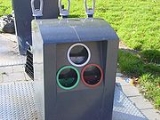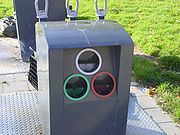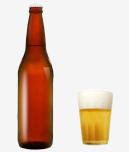
Glass recycling
Encyclopedia

Waste
Waste is unwanted or useless materials. In biology, waste is any of the many unwanted substances or toxins that are expelled from living organisms, metabolic waste; such as urea, sweat or feces. Litter is waste which has been disposed of improperly...
glass
Glass
Glass is an amorphous solid material. Glasses are typically brittle and optically transparent.The most familiar type of glass, used for centuries in windows and drinking vessels, is soda-lime glass, composed of about 75% silica plus Na2O, CaO, and several minor additives...
into usable products. Glass waste should be separated by chemical composition, and then, depending on the end use and local processing capabilities, might also have to be separated into different colors. Many recyclers collect different colors of glass separately since glass retains its color after recycling. The most common types used for consumer containers are colorless glass, green glass, and brown/amber glass.
Glass makes up a large component of household and industrial waste due to its weight and density. The glass component in municipal waste is usually made up of bottle
Bottle
A bottle is a rigid container with a neck that is narrower than the body and a "mouth". By contrast, a jar has a relatively large mouth or opening. Bottles are often made of glass, clay, plastic, aluminum or other impervious materials, and typically used to store liquids such as water, milk, soft...
s, broken glassware
Glassware
This list of glassware includes drinking vessels , tableware, such as dishes, and flatware used to set a table for eating a meal, general glass items such as vases, and glasses used in the catering industry whether made of glass or plastics such as polystyrene and...
, light bulbs and other items. Adding to this waste is the fact that many manual methods of creating glass objects have a defect rate of around forty percent. Glass recycling uses less energy than manufacturing glass from sand, lime and soda.
Every metric ton (1,000 kg) of waste glass recycled into new items saves 315 kilograms of carbon dioxide
Carbon dioxide
Carbon dioxide is a naturally occurring chemical compound composed of two oxygen atoms covalently bonded to a single carbon atom...
from being released into the atmosphere during the creation of new glass. Glass that is crushed and ready to be remelted is called cullet.
Glass collection

Civic amenity site
A civic amenity site or household waste recycling centre is a facility where the public can dispose of household waste and also often containing recycling points. Civic amenity sites are run by the local authority in a given area. Collection points for recyclable waste such as green waste,...
s and in local neighborhoods in the United Kingdom
United Kingdom
The United Kingdom of Great Britain and Northern IrelandIn the United Kingdom and Dependencies, other languages have been officially recognised as legitimate autochthonous languages under the European Charter for Regional or Minority Languages...
. The first Bottle Bank was introduced by Stanley Race CBE
CBE
CBE and C.B.E. are abbreviations for "Commander of the Order of the British Empire", a grade in the Order of the British Empire.Other uses include:* Chemical and Biochemical Engineering...
, then president of the Glass Manufacturers’ Federation and Ron England in Barnsley
Barnsley
Barnsley is a town in South Yorkshire, England. It lies on the River Dearne, north of the city of Sheffield, south of Leeds and west of Doncaster. Barnsley is surrounded by several smaller settlements which together form the Metropolitan Borough of Barnsley, of which Barnsley is the largest and...
on 6 June 1977.
Bottle Banks commonly stand beside collection points for other recyclable waste like paper
Paper
Paper is a thin material mainly used for writing upon, printing upon, drawing or for packaging. It is produced by pressing together moist fibers, typically cellulose pulp derived from wood, rags or grasses, and drying them into flexible sheets....
, metal
Metal
A metal , is an element, compound, or alloy that is a good conductor of both electricity and heat. Metals are usually malleable and shiny, that is they reflect most of incident light...
s and plastic
Plastic
A plastic material is any of a wide range of synthetic or semi-synthetic organic solids used in the manufacture of industrial products. Plastics are typically polymers of high molecular mass, and may contain other substances to improve performance and/or reduce production costs...
s. Local, municipal waste collector
Waste collector
A waste collector is a person employed by a public or private enterprise to collect and remove refuse and recyclables from residential, commercial, industrial or other collection site for further processing and disposal...
s usually have one central point for all types of waste in which large glass containers are located. There are now over 50,000 bottle banks in the United Kingdom
United Kingdom
The United Kingdom of Great Britain and Northern IrelandIn the United Kingdom and Dependencies, other languages have been officially recognised as legitimate autochthonous languages under the European Charter for Regional or Minority Languages...
.
Most collection points have separate bins for clear, green and amber/brown glass. Glass reprocessors require separation by colour as the different colours of glass are usually chemically incompatible. Heat-resistant glass like Pyrex
Pyrex
Pyrex is a brand name for glassware, introduced by Corning Incorporated in 1915.Originally, Pyrex was made from borosilicate glass. In the 1940s the composition was changed for some products to tempered soda-lime glass, which is the most common form of glass used in glass bakeware in the US and has...
or borosilicate glass
Borosilicate glass
Borosilicate glass is a type of glass with the main glass-forming constituents silica and boron oxide. Borosilicate glasses are known for having very low coefficients of thermal expansion , making them resistant to thermal shock, more so than any other common glass...
should not be disposed of in the glass container as even a single piece of such material will alter the viscosity of the fluid in the furnace
Furnace
A furnace is a device used for heating. The name derives from Latin fornax, oven.In American English and Canadian English, the term furnace on its own is generally used to describe household heating systems based on a central furnace , and sometimes as a synonym for kiln, a device used in the...
at remelt.
Germany
In 2004, Germany recycled 2,116,000 tons of glass. Reusable glass or plastic (PET) bottles are available for many drinks, especially beer and carbonated water as well as softdrinks (Mehrwegflaschen). The deposit per bottle (Pfand) is €0.08-€0.15, compared to €0.25 for recyclable but not reusable plastic bottles. There is no deposit for glass bottles which do not get refilled.United Kingdom

Recycling
Recycling is processing used materials into new products to prevent waste of potentially useful materials, reduce the consumption of fresh raw materials, reduce energy usage, reduce air pollution and water pollution by reducing the need for "conventional" waste disposal, and lower greenhouse...
and where it is used for new glass container manufacture it is virtually infinitely recyclable. The use of recycled glass in new containers helps save energy. It helps in brick and ceramic manufacture, and it conserves raw materials, reduces energy consumption, and reduces the volume of waste sent to landfill
Landfill
A landfill site , is a site for the disposal of waste materials by burial and is the oldest form of waste treatment...
.
Secondary uses for recycled glass
In the United Kingdom, the waste recycling industry cannot consume all of the recycled container glass that will become available over the coming years, mainly due to the colour imbalance between that which is manufactured and that which is consumed. The UK imports much more green glass in the form of wineWine
Wine is an alcoholic beverage, made of fermented fruit juice, usually from grapes. The natural chemical balance of grapes lets them ferment without the addition of sugars, acids, enzymes, or other nutrients. Grape wine is produced by fermenting crushed grapes using various types of yeast. Yeast...
bottles than it uses, leading to a surplus amount for recycling.
The resulting surplus of green glass from imported bottles may be exported to producing countries, or used locally in the growing diversity of secondary end uses for recycled glass. Cory Environmental
Cory Environmental
Cory Environmental is a large waste disposal company based in the United Kingdom. Cory operates in more than 30 locations throughout England, providing services in the collection, recycling and disposal of waste as well as municipal cleansing.-Operations:...
are presently shipping glass cullet from the UK to Portugal
Portugal
Portugal , officially the Portuguese Republic is a country situated in southwestern Europe on the Iberian Peninsula. Portugal is the westernmost country of Europe, and is bordered by the Atlantic Ocean to the West and South and by Spain to the North and East. The Atlantic archipelagos of the...
.
The use of the recycled glass as aggregate in concrete has become popular in modern times, with large scale research being carried out at Columbia University in New York. This greatly enhances the aesthetic appeal of the concrete. Recent research findings have shown that concrete made with recycled glass aggregates have shown better long term strength and better thermal insulation due to its better thermal properties of the glass aggregates.
Secondary markets for glass recycling may include:
- Glass in ceramicCeramicA ceramic is an inorganic, nonmetallic solid prepared by the action of heat and subsequent cooling. Ceramic materials may have a crystalline or partly crystalline structure, or may be amorphous...
production - Glass as a flux agent in brick manufactureBrickA brick is a block of ceramic material used in masonry construction, usually laid using various kinds of mortar. It has been regarded as one of the longest lasting and strongest building materials used throughout history.-History:...
- Glass in astroturfAstroTurfAstroTurf is a brand of artificial turf. Although the term is a registered trademark, it is sometimes used as a generic description of any kind of artificial turf. The original AstroTurf product was a short pile synthetic turf while the current products incorporate modern features such as...
and related applications (e.g. top dressing, root zone) material or golf bunkerBunker (golf)A hazard is an area of a golf course in the sport of golf which provides a difficult obstacle. which may be of three types: water hazards such as lakes and rivers; man-made hazards such as bunkers; and natural hazards such as dense vegetation. Special rules apply to playing balls that fall in a...
sand - Glass in recycled glass countertopsRecycled glass countertopsRecycled glass countertops are composed of 100% recycled glass in a cement or petroleum based binder. A finished recycled glass countertop often ranges from 70 to 85 percent in recycled content.- Environmental Concerns :...
- Glass as water filtration mediaSand filterSand filters are used for water purification. There are three main types;# rapid sand filters# upflow sand filters# slow sand filtersAll three methods are used extensively in the water industry throughout the world...
- Glass as an abrasiveAbrasiveAn abrasive is a material, often a mineral, that is used to shape or finish a workpiece through rubbing which leads to part of the workpiece being worn away...
- Glass as an aggregateConstruction AggregateConstruction aggregate, or simply "aggregate", is a broad category of coarse particulate material used in construction, including sand, gravel, crushed stone, slag, recycled concrete and geosynthetic aggregates. Aggregates are the most mined material in the world...
Glass aggregate, a mix of colors crushed to a small size, is substituted for many construction and utility projects in place of pea gravel or crushed rock, oftentimes saving municipalities like the City of Tumwater, Washington
Tumwater, Washington
Tumwater is a city in Thurston County, Washington, United States. It lies near where the Deschutes River enters Budd Inlet, the southernmost point of Puget Sound. The population was 17,371 at the 2010 census...
Public Works
Public works
Public works are a broad category of projects, financed and constructed by the government, for recreational, employment, and health and safety uses in the greater community...
, thousands of dollars (depending on the size of the project). Glass aggregate is not sharp to handle. In many cases, the state Department of Transportation has specifications for use, size and percentage of quantity for use. Common applications are as pipe bedding--placed around sewer, storm water or drinking water pipes to transfer weight from the surface and protect the pipe. Another common use would be as fill to bring the level of a concrete floor even with a foundation.
Mixed waste streams may be collected from materials recovery facilities or mechanical biological treatment
Mechanical biological treatment
A mechanical biological treatment system is a type of waste processing facility that combines a sorting facility with a form of biological treatment such as composting or anaerobic digestion...
systems. Some facilities can sort out mixed waste streams into different colours using electro-optical sorting units.
United States
Rates of recycling and methods of waste collection vary substantially across the United States because laws are written on the state or local level and large municipalities often have their own unique systems. Many cities do curb-side recycling, meaning they collect household recyclable waste on a weekly or bi-weekly basis that residents set out in special containers in front of their homes.Apartment dwellers usually use shared containers that may be collected by the city or by private recycling companies which can have their own recycling rules. In some cases, glass is specifically separated into its own container because broken glass is a hazard to the people who later manually sort the co-mingled recyclables. Sorted recyclables are later sold to companies.
In 1971 the state of Oregon passed a law requiring buyers of carbonated beverages (such as beer and soda) to pay five cents per container as a deposit which would be refunded to anyone who returned the container for recycling. This law has since been copied in nine other states including New York and California. The abbreviations of states with deposit laws are printed on all qualifying bottles and cans. In states with these container deposit laws, most supermarkets automate the deposit refund process by providing machines which will count containers as they are inserted and then print credit vouchers that can be redeemed at the store for the number of containers returned. Small glass bottles (mostly beer) are broken, one-by-one, inside these deposit refund machines as the bottles are inserted. A large, wheeled hopper (very roughly 1.5m by 1.5m by 0.5m) inside the machine collects the broken glass until it can be emptied by an employee.
See also
- Castlemaine Tooheys Ltd v South AustraliaCastlemaine Tooheys Ltd v South AustraliaCastlemaine Tooheys Ltd v South Australia 169 CLR 436 is a High Court of Australia case that deals with whether a particular Act of South Australia contravenes section 92 of the Australian Constitution, which is about the freedom of interstate trade....
- GlassGlassGlass is an amorphous solid material. Glasses are typically brittle and optically transparent.The most familiar type of glass, used for centuries in windows and drinking vessels, is soda-lime glass, composed of about 75% silica plus Na2O, CaO, and several minor additives...
- RecyclingRecyclingRecycling is processing used materials into new products to prevent waste of potentially useful materials, reduce the consumption of fresh raw materials, reduce energy usage, reduce air pollution and water pollution by reducing the need for "conventional" waste disposal, and lower greenhouse...
- Waste managementWaste managementWaste management is the collection, transport, processing or disposal,managing and monitoring of waste materials. The term usually relates to materials produced by human activity, and the process is generally undertaken to reduce their effect on health, the environment or aesthetics...
- BalerBalerA baler is a piece of farm machinery used to compress a cut and raked crop into compact bales that are easy to handle, transport and store...
- Glass crusherGlass CrusherA glass crusher provides for pulverization of glass to a yield size of 2" or less. Recycling operations may range from simple manually fed self contained machines to extravagant crushing systems complete with screens, conveyors, crushers and separators. All non-glass contaminants must generally be...
External links
- US & Canadian glass cullet specifications
- "Plant Chops Old Bottles For New", August 1949, Popular Science article on the basics of glass recycling
- http://www.strategicmaterials.com

